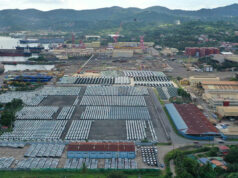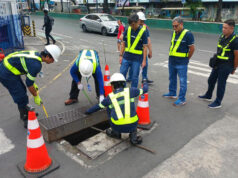By Victor V. Saulon, Sub-editor
TRINA Solar Energy Development Pte. Ltd. is looking at entering the minigrid business in the country and has tapped the services of lawyers to study the details of a regulation being drafted by government agencies covering the so-called “distributed power.”
“It’s actually a good market to penetrate. So that’s something that we are looking into. There are certain legal things that we need to abide with because I think for you to do that, I think you need to be certified to sell electricity,” said Junrhey Castro, Trina Solar country manager, in an interview after the company presented its plan in the Philippines.
“So there’s an RES (retail electricity supply) process. You need to be RES — there’s a certificate that you need to obtain,” he said, referring to the license being issued by the Energy Regulatory Commission (ERC) on entities that plan to sell electricity to “contestable” customers or those whose average monthly consumption in the past year reach a set threshold.
A minigrid or a microgrid acts as a single controllable grid and can connect and disconnect from the national grid to enable it to operate in both grid-connected or island mode. It has clearly defined boundaries.
“That’s a good part of the business and we’ve been looking into that. Actually what we have done is we’ve worked with another company who’s doing that business specifically. Though we are only supplying equipment to them. And we are giving technical advice, that’s already a good kickstart for us for that market,” Mr. Castro said.
“The grid is a big issue and if you can deliver products, services, basically the idea of that business is you become a utility provider on a small scale, a mini utility provider on the small scale,” Mr. Castro said.
For now, the company is looking into partnerships with local entities for projects that will give it a headstart in the minigrid business.
“We have to build a local company, where of course you have to abide with the 60-40 rule,” he said, referring to the limitation under Philippine laws that limit the ownership stake of a foreign entity to 40%.
Mr. Castro said it has started the process of creating a new company, which will have to be registered with the Securities and Exchange Commission.
“We have hired a legal lawyer to look into the technicalities of the draft and how we can penetrate into that market so we’re still on a discussion with them,” he added.
In the near term, Trina Solar is targetting to install 5-6 megawatts (MW) of solar rooftop energy systems in Filipino homes each year as it sets its sights on the local residential market.
“We have quite a bit of aggressive target in the Philippines,” Mr. Castro said. “Usually we are given the task of at least 10% market share.”
Mr. Castro, who is also Trina Solar senior sales head for Australia and Southeast Asia, said the installation would cover both residential and commercial market segments, and distributed as “a few kilowatts here and there.”
Trina Solar, which describes itself as a global leader in total energy solutions, recently launched its Trinahome solutions brand that focuses on residential consumers. The parent firm has previous projects in the Philippines but mostly industrial scale development.
Mr. Castro said Trinahome is a “plug and play” residential solutions that come with warranties and backed by an internationally bankable supplier.



